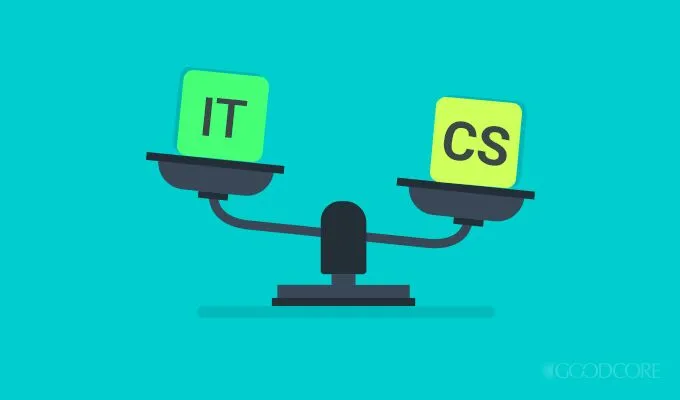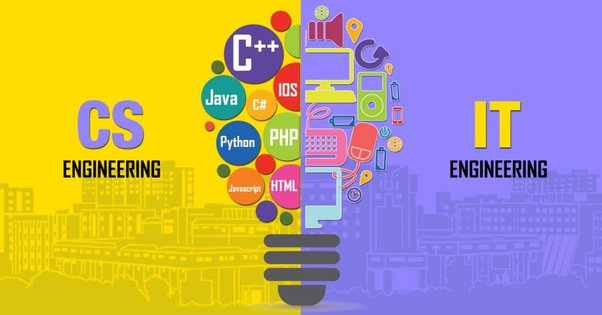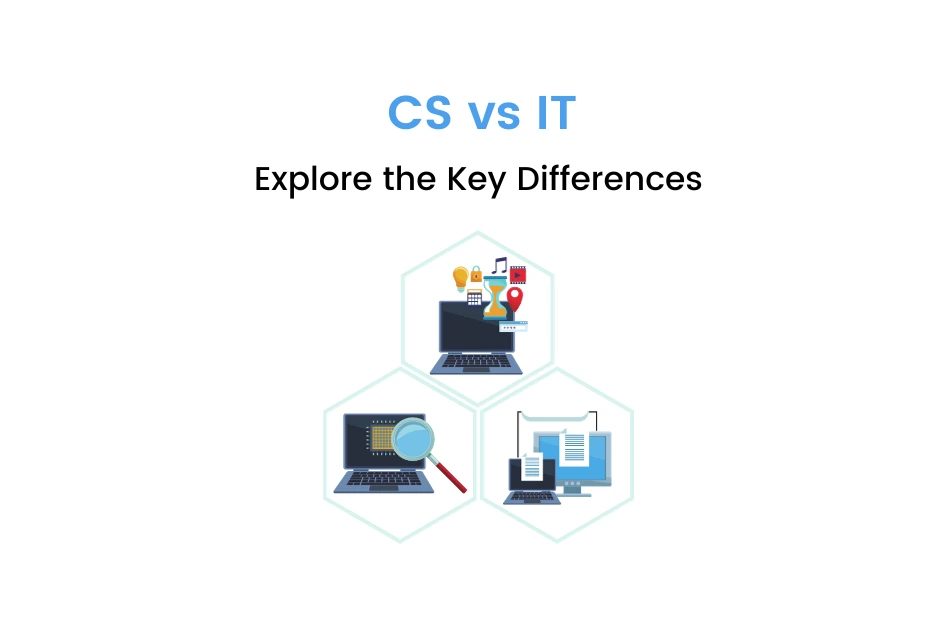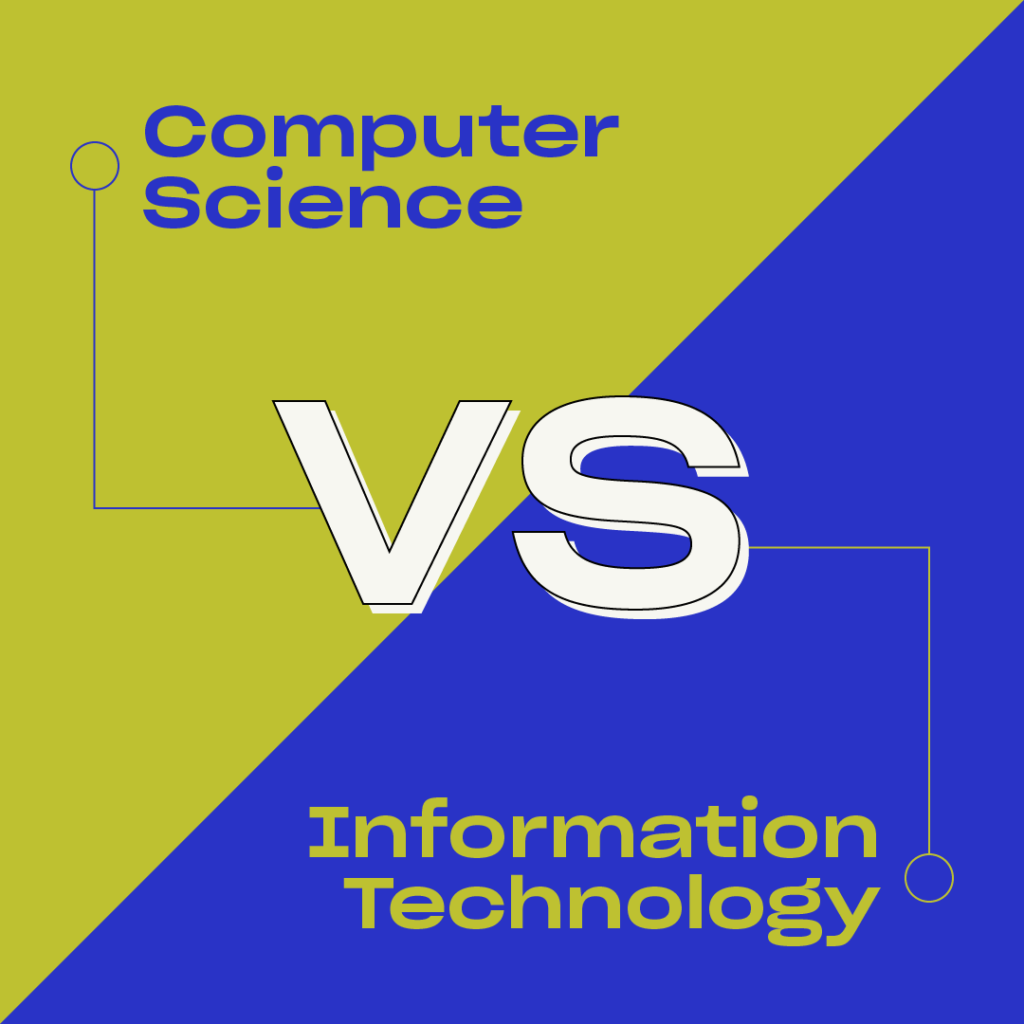Computer Science (CS) and Information Technology (IT) are closely related but have different focuses. CS deals with the theory and fundamentals of computing, including algorithms, programming languages, and computer architecture. It’s like learning the ABCs of computers and exploring how to create software, develop artificial intelligence, and more.
On the other hand, IT is more practical, focusing on managing and maintaining computer systems and networks. IT professionals handle tasks like network administration, cybersecurity, and database management.
While CS is about understanding how computers work, IT is about making sure they work smoothly. Both fields are essential in the digital world, with CS providing the foundation and IT ensuring everything runs smoothly.
What is Computer Science?

Computer Science encompasses the study of computers and their applications, focusing on the processing of information. It covers a broad range of topics, including hardware and software components, algorithms, data structures, artificial intelligence, and network design.
In the world of computers, there are different jobs people do. Computer Engineers build things for computers, like hardware, software, and networks. Information Systems folks organize all the computer data to make it useful for us.
Information Technology people make sure everything with computers runs smoothly and we can get the info we need. And Software Engineers are like the fixers, making sure apps and websites work right by designing and testing them.
So, Computer Engineers make the tools, Information Systems organize the data, Information Technology manages it, and Software Engineers keep everything running smoothly.
Career paths within Computer Science include:
- Backend Engineering: Developing microservices and APIs using languages like Python, Java, PHP, and more.
- Frontend Engineering: Creating user interfaces with markup languages, CSS, and JavaScript.
- Fullstack Engineering: Combining frontend and backend development to create comprehensive solutions.
- Data Science: Analyzing data to derive insights and make data-driven decisions.
- Artificial Intelligence Engineering: Developing systems that mimic human intelligence.
- System Analysis: Analyzing business systems to identify goals and problems and propose solutions.
- Database Administration: Managing and maintaining database management systems like MySQL, PostgreSQL, MongoDB, etc.
What is Information Technology?
Information Technology (IT) involves the management of computers and information systems, encompassing both hardware and software components. Its primary goal is to utilize existing computer systems to address various problems and support organizational needs.
IT professionals are responsible for tasks such as coordinating computer systems, ensuring their proper functioning, and troubleshooting any issues that may arise.
Career paths within the realm of IT include:
- Business Intelligence Analysis: Analyzing data to derive insights that can aid in decision-making for businesses.
- Customer Support Technician: Providing technical support to customers, assisting them with troubleshooting and problem-solving.
- Cybersecurity: Protecting computer systems, networks, and data from cyber threats and attacks.
- Cloud Computing: Delivering computing services, such as storage and processing power, over the internet rather than on local servers or personal computers.
- Augmented Reality (AR): Distributing sensory information, such as visuals and sounds, to enhance the real-world environment typically through glasses or smartphones.
- Virtual Reality (VR): Designing and implementing computer-generated environments that simulate real-world experiences.
Education and Focus of IT Vs CS

Here’s a comparison of the education and focus of Information Technology (IT) and Computer Science (CS):
Information Technology (IT)
In IT programs, students usually get a blend of theory and hands-on skills. Many in IT begin with associate’s or bachelor’s degrees, while others choose certifications or vocational training in relevant fields.
These programs mainly concentrate on teaching practical skills needed to handle computer systems and networks. Learn to manage networks, set up systems, protect against cyber threats, handle databases, and efficiently oversee IT projects.
Computer Science (CS)
Computer Science programs are like learning the building blocks of computers. Most people who work in Computer Science hold a bachelor’s degree or higher in Computer Science or similar fields. However, some individuals also learn on their own or attend coding boot camps.
These programs focus on the basics of computing, like algorithms, programming languages, and how computers are put together. You also get to explore different areas like making software and teaching computers to think with artificial intelligence. Additionally, you can delve into figuring out how to make computer graphics look cool. It’s like learning the ABCs of computers and then exploring all the fun things you can do with them!
IT skills Vs computer science skills
| Computer Science Skills | IT Skills |
| Programming languages like Python, C++, HTML, CSS, Javascript | Programming languages, especially scripting languages like Python and Powershell |
| Statistics, algebra, and/or calculus | Troubleshooting methods |
| Familiarity with code-sharing platforms like GitHub | Network configuration |
| Understanding of the software development lifecycle | Security infrastructure like setting up firewalls and routers |
| Artificial intelligence methods like machine learning and deep learning, and tools like Apache Spark and Hadoop | Ethical hacking or penetration testing |
| Data analysis and database tools like SQL, MongoDB, PostgreSQL, Excel | Data administration skills like SQL |
Computer science VS IT salaries
| Computer Science Jobs | Salary (Average Base Pay in US, Glassdoor) | IT Jobs | Salary (Average Base Pay in US, Glassdoor) |
| Web Developer | $82,690 | Computer Technician | $45,809 |
| Robotics Engineer | $101,108 | Helpdesk Technician | $49,743 |
| Full Stack Developer | $87,080 | Cybersecurity Specialist | $89,115 |
| Software Engineer | $105,772 | System Administrator | $78,645 |
| Artificial Intelligence Eng. | $125,124 | Database Administrator | $84,082 |
| Back End Engineer | $126,948 | Network Administrator | $71,311 |
| Data Scientist | $124,223 | Cloud Engineer | $151,884 |
IT vs Computer Science specializations
| Information Technology (IT) Specializations | Computer Science Specializations |
| Network Administration | Artificial Intelligence |
| System Administration | Machine Learning |
| IT Security | Human-Computer Interaction (HCI) |
| Enterprise Systems | Data Science |
| IT Management | Cybersecurity |
| International Biometrics | Cloud Computing |
| IT Strategy and Innovation | Video Game Development |
IT vs Computer Science classes

| Information Technology Classes | Computer Science Classes |
| Information Systems | Theory of Computation |
| Network Engineering | Software Security |
| Operating Systems | Computer Graphics |
| Database Fundamentals | Algorithms and Data Structures |
| Information Security Fundamentals | Calculus |
| System Analysis | Linear Algebra |
| Business Technology | Software Engineering |
| Hardware and Software Troubleshooting | Web Development |
| Network Administration | Cryptography |
| IT Ethics | Programming |
Which is better Computer Science or IT?
Deciding between Computer Science and Information Technology depends on your interests and career goals. Both fields offer rewarding opportunities and can lead to fulfilling careers in technology.
Computer Science focuses more on theoretical concepts, algorithms, and software development, while Information Technology emphasizes practical applications, network administration, and system management.
Ultimately, the best choice depends on your passion for technology and which field aligns better with your interests and career aspirations.
FAQ’s
Is computer science (CS) better than information technology (IT)?
It depends on what you prefer and your career goals. CS graduates might have access to more specialized opportunities, while IT professionals often work collaboratively to solve tech issues. CS can seem more challenging due to its broader scope, but both fields offer wide-ranging opportunities.
Is CS more difficult than IT?
Yes, Many people compare Computer Science and Information Technology in terms of difficulty. While some think IT is easier because it’s more focused, both majors have their challenges. CS has a wider scope, but both fields offer diverse opportunities for those with the right skills and interests.
Final Words
Computer Science (CS) teaches how computers work, while Information Technology (IT) focuses on making them work smoothly. CS is like learning the basics of computer building blocks, while IT is about managing and fixing computer systems. Both are vital in our digital world: CS for understanding and creating new technology, and IT for keeping it running smoothly.
Whether you’re curious about computers or want to ensure they run efficiently, both CS and IT offer exciting opportunities in the tech field.
